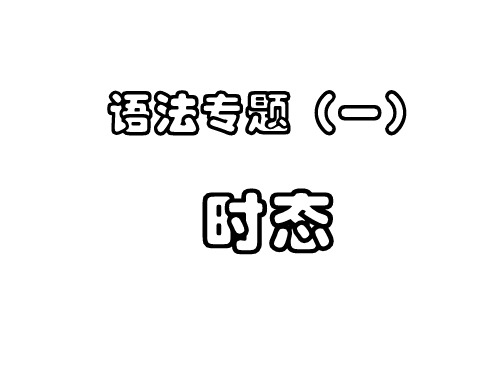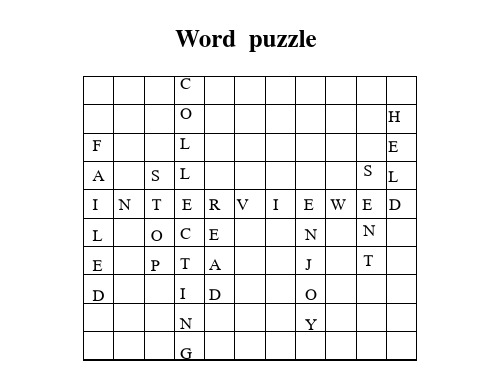英语时态8种基本时态讲解.ppt
初中英语八种时态讲解-课件PPT

什么情况下用?
①表示经常或习惯性的动作或存 在的状态。②表示主语通常的能 力、兴趣爱好、和性格特征。③ 表示客观的事实或真理。④表示 按照时刻表或已经计划安排好的 将来行为。(只限于是go, come, leave, arrive, begin, start, take off, stop, be等表示开始或移动意义的 词。)⑤在时间状语从句和条件 状语从句中,主句用一般将来时 (will+动词原形),从句中用一般
变“y”为“i”再加-ed
worry→worried
cry→cried
1. He____(be, was, were, been) here a moment ago. 2. They ____(be, was, were, been) here just now. 3. The scientists _____(leave, leaves, leaved, left) for America yesterday. 4. Last week we ______(visit, visited ) the Science Museum. 5. When I was a child, I often ____(play, played) football. 6. The students ran out of the classroom as soon as the bell ____(ring, rang, rung).
一般过去时
概念:过去某个时间里发生的动作或 状态;过去习惯性、经常性的动作、 行为。 时间状语:ago, yesterday, the day before yesterday, last week(year, night, month…), in 1989, just now, at the age of 5, one day, long long ago, once upon a time, etc. 基本结构:①be动词;②行为动词 否定形式:①was/were+not;②在行为 动词前加didn't,同时还原行为动词。 一般疑问句:①was或were放于句首; ②用助动词do的过去式did 提问,同时 还原行为动词。
英语时态8种基本时态讲解.ppt课件

8.过去完成时 表示动作发生在过去某一时间之前已经完成的动作或状态, 强调“过去的过去”, 常与 by the time, by the end of…,before , by 等引导时间的状语连用。
基本结构 主语+ had + 动词过去分词 + 其他成分 When I got to the cinema yesterday the film had begun already. He had learned English before he came here.
现在完成时与一般过去时的区别: 1)现在完成时侧重于对现在的影响;而一般过去时侧重于某一动作发生在过去某个时间或某段时间。即现在完成时侧重于现在的结果,而一般过去时侧重于动作发生的时间。例如:
I have seen the film. 我看过这部电影。(现在我仍记得电影的内容) I saw the film three days ago. 三天前我看了这部电影。(强调是三天前,而不是别的什么时候看的电影)
be going to含有“打算,准备”的意思,而will则没有这个意思, She is going to lend us her book. He will be here in half an hour.
be about to+V.原形(意为马上做某事,在时间上指最近的将来) I am about to leave school. 不能与表示时间的副词连用。 They are about to set out.(√) They are about to set,变y为i加-ed. study----studied carry----carried cry----cried try----tried d)以元音字母+y结尾的单词直接加-ed. play----played stay----stayed
中考英语专题 --八种常见动词时态讲解(共49张PPT)

二、一般过去时
1.一般过去时的结构:
主语+动词过去式+其它
I did my homework yesterday.
(did就是do的过去式) 否定构成:didn’t+动原 一般疑问构成及简答举例:Did+主语+动原+其它? 特殊疑问句举例:What did he do yesterday? When did he get up this morning?
火车明天上午六点开。
6)在复合句中,当主句是一般将来时,时间状语 从句或条件状语从句的谓语动词只能用一般现在 时来表示将来。 例如: I'll tell him the news when he comes back. 他 回来时,我将告诉他这个消息。
If you take the job , they will talk with you in greater details. 如果你接受这份工作,他们将和你谈谈细节。
I do my homework every day.
1.改为一般疑问句并回答。 Do you do your homework every day? Yes, I do./No, I don't. 2.改为否定句。 I don't do my homework every day.
Jim does his homework every day. 1.改为一般疑问句并回答。 Does Jim do his homework every day? Yes, he does./No, he doesn't. 2.改为否定句。 Jim doesn't do his homework every day.
八大时态讲解(共26张PPT)

0 一般过去将来时:
He was sixty-eight. In two years he would be seventy.
I knew you would agree.
0 现在英进行语时的: 动词时态(进行) What are you doing?
算;
如:I am going to listen to music. (我打算听音乐) will /shall 表示未事先思考或为计划过的意图
如:It will be Christmas soon .(很快就圣诞节了)
4. 现在进行时态( The Present Continuous Tense )
5、我们离开广州六年了。
We have left Guangzhou for 6 years . ×
We have been away from Guangzhou for 6
years .
3.常见句型
1) 主句(现在完成时)+since 从句(一般过去时).
2) It is +一段时间+ since 从句(一般过去时).
has gone to
He said had seen this morning, …ago, etc
that he _________the film many 如果明天不下雨,我们将去野营。
He has borrowed the pen for three days .
times. 现在进行时态( The Present Continuous Tense )
was /were going to +动词原形
初中英语八种时态归纳PPT

Part B 语态
Active Voice
Passive Voice
主动语态
1. Many people speak English.
At the party.
--- I _l_ik_e___ your jacket, Tim. How long _h_a_v_e_y_o_u__h_a_d__ it?
Oh…er… I __b_o_u_g_h_t__it last week. W__o_u_l_d_y_o_u__li_k_e_ to dance, Becky? ---Phew. It’s __h_o_t__ here. --- Put your jacket on the chair. You ____n_e_e_d_n’wt orry. It’ll be ok. ---That’s _b_e_tt_e_r __.
8. Mr. Green and his wife had lived (live) in London for a few years before they came (come) to work in China in 2001.
9. He said he w__o_u_ld__n_o_t_s_p_e_a(k not,speak) at the meeting the next day.
4. Hurry! Your classmates _a_r_e_w__a_it_i_n_g(wait) for you in the classroom..
1. This is the third time you _h_a_v_e__b_e_e_n__(be) here.
初中英语中考复习时态讲解课件(共79张ppt)

一般现在时
1. 表示经常性或习惯性的动作
She does excersice everyday.
真题链接
—What do you often do at weekends?
—I often ____ my grandparents.
A. visit
B. visited
C. have visited D. will visit
Just a moment, I am washing dishes.
when
习题
Just a minute! My brother________ his car in the garden. A. washes B. is washing C. washed D. will wash
习题
---Hey, Tom. Let’s go swimming.
动词过去分词 不规则变化
speak hear see give build swim buy teach
spoken heard seen given built swum bought taught
现在完成时
already yet
1.过去发生或已完成的某一动作对现在的影响。
I have already watched this film. I haven't watched this film yet. I have already visited America. I haven't visited America yet.
A. prepares
B. is preparing
C. has prepared D. prepared
真题链接
--Mum, it's late. Why are you still here? --Dad hasn't come back yet. I ____ for him. A. am waitingB. was waiting C. waited D. had waited
英语十六种时态ppt课件
6
2.一般过去时的肯定、疑问、否定三种形式
肯定式
疑问式
否定式
I worked.
Did I work?
I did not work.
He (She, It)worked. Did he (she, it) work? He (She, It) did not work.
13
范围扩展
1. 用过去进行时表示现在主要是为了使语气委婉、客气。 I was wondering if you can give me a lift. 我不知你能否让我搭一下车。 (一般过去时也有类似用法,但比较而言,用过去进
行时显得更客气,更加不肯定。)
2.动词be的过去进行时也可表示过去一时的表现或暂时的 状态。
现在进行时表示说话时正在进行的动作或表示目前一段时 间内正在进行的活动,与现在进行时连用的时间状语有now, these days等。
—What is your mother doing now? 你的妈妈正在干什么? —She is cooking for us. 她正在为我们做饭。 2.现在进行时的具体用法
10
用法
例句
(1) 说话瞬间正在发生的动作,常见的时间 They are watching TV now.
状语有now,at the moment等。如果句首有 他们现在正在看电视。
警示性动词look,listen等,主句的动词也 Listen! The bird is singing in the tree.
(2) be (am, is, are) going to + 动词原形 2.一般将来时的用法
英语八大时态详细讲解
5.不规则变化
六、过去进行时
1.构成:①肯定结构:主语+was/were + doing+ (宾语)
②否定结构:主语+was/were not + doing+ (宾语)
④不能用于进行时的动词:A.表示感觉的(feel, smell, sound, taste)
Eg. The plan sounds good.
B.表示感情、拥有关系、状态或思想的动词:agree, believe, belong, contain, hate, hear, like, love, mind, possess, seem, understand, want等
Eg. I wasgoingto leave when it began to rain.
He looked as if he was about to burst into tears.
③was/were to do和was/were doing:
Eg. I was seeing off my sister at the station the next day.
4)重读闭音节,双写词尾辅音字母加ed.如: preferred(重读在fer前); admittedstopped
三、一般将来时
1.结构:①肯定结构:主语+be going to + do或者will/shall + do+宾语
②否定结构:主语+be not going to + do或者will/shall not + do+宾语
He is not going to play basketball this weekend.
英语八大时态讲解
英语八大时态讲解英语八大时态:一般现在时一般过去时一般将来时现在进行时过去进行时现在完成时过去完成时过去将来时一、一般现在时标志:动词原形情况变形方法读音清辅音后读/s/ 浊辅音和元音后读/z/ 读/z/ 读/iz/ 读/z/ 例词 swim--swims help--helps like--likes go--goes do--does watch--watches wash--washes study--studies have--hasbe--am/is/are 一般情况 +s 辅音字母+o结尾 s/sh/ch/x等结尾辅音字母+y结尾特殊情况:have和be动词 +es +es 变y 为i+es 变have 为 has 变be为am/is/are 1. 表示经常性或习惯性动作,常与表频度的时间状语连用:She often speaks English.I leave home for school at 7 every morning. 造句练习:孩子们通常不喜欢家庭作业。
2. 表示现在的状态、特征、职业、能力、感觉等:He seems to feel a bit down today. He works as a driver.造句练习:她英语说得好。
3. 表示真理、客观存在、科学事实或用于格言警句中:Shanghai lies in the east of China.Columbus proved that the earth is round. Where there is a will, there is a way. 造句练习:地球绕太阳转动。
4. 表示现在瞬间的动作:Here comes the bus! 5. 表示将来1) 表按规定、计划、安排将要发生的动作(仅限于某些表示“来、去、动、停、开始、结束、继续”等的趋向动词),可以与表示未来的时间状语搭配使用。
常见的用法是:飞机、火车、轮船、汽车等定期定点运行的交通状况。
初中英语八大时态讲解_图文
2 have been to+地点,表示“去过某地”
。(人已回) I have been to Europe. (I am not in Europe now.)
3 have been in+地点+时间段,表示“在/ 来某地多久”。
I have been in Europe for three weeks. (I am now still in Europe .)
go there get home open close get to know borrow buy
be there be home be open be closed know keep have
1.The film began 5 The film_h_a_s b_e_en_o_n__ for 5
• 9.They got to know 10 They_h_av_e_k_n_o_w_n__since 10
years ago.
years ago.
• 10.I borrowed the book a I_h_a_v_e _k_e_p_t _the book for a
week ago.
week.
二、一般过去时
1.用法:过去的动作或状态。
2.标志词:
yesterday, the day before yesterday,
three days ago, last night/week/month…,in the past;just
now=a moment ago
例题
Li Ming didn’t understand what American people
4.He joined the club 3 He__h_as_b_e_en_i_n__the club for
- 1、下载文档前请自行甄别文档内容的完整性,平台不提供额外的编辑、内容补充、找答案等附加服务。
- 2、"仅部分预览"的文档,不可在线预览部分如存在完整性等问题,可反馈申请退款(可完整预览的文档不适用该条件!)。
- 3、如文档侵犯您的权益,请联系客服反馈,我们会尽快为您处理(人工客服工作时间:9:00-18:30)。
• 否定句和疑问句。 • b)----We get up at 7:30 in the morning .
-----We don’t get up at 7:30 in the morning . • -----Do you get up at 7:30 in the morning ? • -----Yes, we do. / No, we don’t.
• 4)动词过去式变化规则。 • a)一般情况下的词加-ed. • work---worked call----called • b)以不发音的字母e结尾的单词直接加-d . • live----lived change----changed smoke-
---smoked die----died graduate---graduated drive----drove
• 3.一般将来时
• 表示将来发生的动作或存在的状态, 常与表将来的时间状语tomorrow, the day after tomorrow, next Sunday, soon, in a few days等连用。
• b)----He smoked last year. • -----He didn’t smoke last year. • -----Did he smoke last year? • -----Yes ,he did ./No ,he didn’t.
• c)----He joined the army in 1990. • -----He didn’t joined the army in 1990. • -----Did he join the army in 1990? • -----Yes ,he did ./No ,he didn’t.
• 第三人称单数变化形式。 • a)一般情况动词在词尾加-s . • come---comes speak---speaks • b)以o, s, x, ch, sh结尾的单词在词后加es. • do---does go---goes finish---finishes
• fix---fixes pass---passes watch---watches
• c)以辅音字母+y结尾的单词,变y 为i加-ed.
• study----studied carry----carried cry----cried try----tried
• d)以元音字母+y结尾的单词直接 加-ed.
• play----played stay----stayed
• e)以元音+辅音结尾的单词应先双 写这个辅音字母然后再加-ed.
• c)----He likes music. • ----He doesn’t like music. • ----Does he like music? • ----Yes ,he does./ No, he doesn’t .
• 2.一般过去时 • 表示发生在过去的动作或存在的状态,
通常与表示过去的时间状语如yesterday, last night ,some years ago, in 1990,in those days.等连用。
英语8种基本时态讲解
• 一.概念:英语中表示不同时 间发生的动作或存在的状态, 需用不同的动词形式表示,这 种不同的动词形式称为时态。
• 二.种类:(基本时态) • 一般现在时 一般过去时 • 现在进行时 过去进行时 • 一般将来时 过去将来时 • 现在完成时 过去完成时
1.一般现在时:
• 句型结构:主语+V.(包括be动词)+ 宾语+其他成分
• 注意: • 一般现在时通常与always , often ,
usually 等频度副词以及 every day , sometimes , once a week 等时间状 语连用。
• I always watch TV at 8:00 in the evening .
• They go home once a week .
• c)以辅音字母+y结尾的单词变y为i加 -es.
• Study---studies carry-carries • d)以元音字母+y结尾的单词直接加-s.
• play---plays stay---stห้องสมุดไป่ตู้ys
• 否定句和疑问句。 • a)-----He is an engineer. • -----He isn’t an engineer. • -----Is he an engineer? • -----Yes, he is ./ No, he isn’t.
• I was a student 6years ago.
• I went to Beijing last year.
• 句型结构:主语+V.过去时+宾 语+其他成分
• They saw a film last night .
• 否定句和疑问句。 • a)----He was busy yesterday. • -----He wasn’t busy. • -----Was he busy? • -----Yes, he was./ No, he wasn’t.
• 当主语是第三人称单数时,动词词尾加s或-es
• 1)表示经常发生或习惯性的动作或状态。 • He has breakfast at 6:00every day.
• 2)表客观现实和普遍真理。 • The sun always rises in the east . • 3)表永远性的动作或状态。 • He lives in the country .
• stop----stopped plan----planned pat----patted
• f)动词不规则变化:
• do----did go----went come----came run----ran
• begin----began drink----drank keep---kept
• cut----cut set----set let----let
